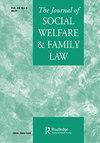透过玻璃,黑暗:加拉格尔和透明的金融救济法庭
IF 0.9
Q2 LAW
引用次数: 0
摘要
关于是否应该在公开的判决书和媒体报道中指明家庭案件中的当事人,最近有很多争论。在对辩论的重要贡献中,Mostyn J调查了他在Gallagher v Gallagher (No.1)(报告限制)[2022]EWFC 52中判决的法律立场,并提出了应采取的财务救济程序报告方法。根据FPR 17.10-11的规定,财务救济程序以非公开方式进行。记者和认可的法律博主可以参加听证会,除非因FPR 27.11中规定的原因被排除在外(Holman J在Fields v Fields [2015] EWHC 1670中描述为“严格和有限的例外”)。然而,出席率和发表并不是一回事。无论听审是在公开法庭还是在非公开法庭进行,出版与听审有关的资料都可能受到《1960年司法行政法》第12条的限制,该法规定了在何种情况下出版听审将构成藐视法庭罪。财务救济案件不属于《藐视法庭罪条例》的规定,除非该等案件全部或主要与抚养未成年人有关,或发布该等资料的人违反了就该特定案件作出的限制报告令或匿名令。因此,Mostyn J在Xanthopoulos v Rakshina [2022] EWFC中得出结论,除了这两种情况外,财务救济案件可以报告,只要不滥用机密信息,当事人可以自由讨论。法庭不公开开庭的事实无非是限制了旁听的人数。当然,法院可以发布报道限制令(RRO)或匿名令,但前提是法院首先要像Re S [2004] UKHL 47一样,仔细权衡所涉及的权利——第8条既包括隐私权,也包括自主权,包括讲述自己故事的权利;第十条:言论自由;以及(在宪法法院本身没有争议)第六条要求公平和公开听证。本文章由计算机程序翻译,如有差异,请以英文原文为准。
Through a glass, darkly: Gallagher and transparency in the financial remedies court
There has been much recent debate about whether parties in family cases should be identified in published judgments and media reports. In an important contribution to the debate, Mostyn J surveys the legal position in his judgment in Gallagher v Gallagher (No.1) (Reporting Restrictions) [2022] EWFC 52 and sets out the approach that should be taken to the reporting of financial remedies proceedings. Financial remedies proceedings are conducted in private by virtue of FPR 17.10–11. Journalists and accredited legal bloggers can attend hearings unless excluded for the reasons set out in FPR 27.11 (described by Holman J in Fields v Fields [2015] EWHC 1670 as ‘strict and limited exceptions’). However, attendance and publication are not the same thing. Whether the hearing is in open court or in private, publication of information relating to it may be caught by s12 Administration of Justice Act 1960, which sets out the circumstances in which publication would constitute contempt. Financial remedy cases do not fall within s12 ʹ s contempt provisions unless they relate wholly or mainly to the maintenance of a minor, or because the person publishing the information is doing so contrary to a reporting restriction order or anonymity order made in that particular case. Mostyn J therefore concluded in Xanthopoulos v Rakshina [2022] EWFC that with the exception of these two situations, financial remedy cases could be reported and – as long as they do not misuse confidential information – freely discussed by the parties. The fact of a court sitting in private did no more than limit who could be present at the hearing. The court could make a reporting restriction order (RRO) or anonymity order, certainly, but only if the court had first, as in Re S [2004] UKHL 47, carefully weighed the rights engaged – Article 8 ʹ s privacy but also autonomy, including the right to tell one’s own story; Article 10 ʹ s freedom of expression; and (not at issue in Re S itself) Article 6 ʹ s fair and public hearing.
求助全文
通过发布文献求助,成功后即可免费获取论文全文。
去求助
来源期刊
CiteScore
2.00
自引率
13.30%
发文量
52
期刊介绍:
The Journal of Social Welfare & Family Law is concerned with social and family law and policy in a UK, European and international context. The policy of the Editors and of the Editorial Board is to provide an interdisciplinary forum to which academics and professionals working in the social welfare and related fields may turn for guidance, comment and informed debate. Features: •Articles •Cases •European Section •Current Development •Ombudsman"s Section •Book Reviews

 求助内容:
求助内容: 应助结果提醒方式:
应助结果提醒方式:


